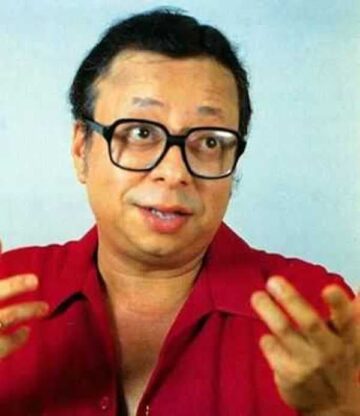Artist Biography
Rahul Dev Burman 27 June 1939 – 4 January 1994 was an Indian music director. He is often regarded as one of the most predominant musical forces that Indian cinema has ever witnessed. From the 1960s to the 1990s, Burman composed musical scores for 331 films. Burman did major work with his wife, Asha Bhosle and Kishore Kumar and scored many of the songs that made these singers famous. He has also scored many songs sung by his sister-in-law, Lata Mangeshkar. Nicknamed Pancham Da, he was the only son of the composer Sachin Dev Burman.
Early life
Rahul Dev Burman was born in Calcutta. According to stories, he was nicknamed Pancham because, as a child, whenever he cried, it sounded in the fifth note (Pa) of the Indian musical scale. The word Pancham means five (or fifth) in Bengali and Sanskrit. Another version is that when the veteran Indian actor Ashok Kumar saw a newborn Rahul Dev Burman uttering the syllable Pa repeatedly, he nicknamed the boy Pancham. After coming to Mumbai, he learnt sarod from Ustad Ali Akbar Khan.. He received his early education at Ballygunj Govt. High School, Kolkata
Burman was born to the Bollywood composer and singer, Sachin Dev Burman, and his lyricist wife Meera Dev Burman , in Calcutta. Initially, he was nicknamed Tublu by his maternal grandmother, although he later became known by the nickname Pancham. According to some stories, he was nicknamed Pancham because, as a child, whenever he cried, it sounded in the fifth note, G scale, of music notation; in Hindustani Classical Music, Pancham is the name of the fifth scale degree. Another theory says that the baby was nicknamed Pancham because he could cry in five different notes. Yet another version is that when the veteran Indian actor Ashok Kumar saw a newborn Rahul uttering the syllable Pa repeatedly, he nicknamed the boy Pancham.
He was mainly active in the Hindi film industry as a composer, and also provided vocals for a few compositions. He served as an influence to the next generation of Indian music directors,and his songs continue to be popular in India and overseas.
At the height of his career, there were repeated questions concerning his “borrowing” of themes from other songs. We must remember India is generally known for its rather pragmatic and liberal approach to intellectual property laws; and all of the Indian genres of music, be they classical, folk, or popular, find themes freely passing from one artist to another. However, the extent to which RD Burman “borrowed” material is generally considered to have exceeded even what was normal for Bollywood. For example Aao Twist Karein (“Bhoot Bhangla” – 1965) is a ripoff of Let’s Twist Again by Chubby Checker; Tera Mujhse Hai Pehle Ka Naata Koi (“Aaa Gale Lag Ja” – 1973) is lifted from The Yellow Rose of Texas (Traditional Texas folksong), or Tumse Milke (“Parinda” – 1989) was lifted from When I Need You (Hammond & Sager). This list of R.D. Burman songs that contained material that was “borrowed” from pre-existing sources, is so long that many say that the majority of his career was actually based upon plagiarism. I think that it is an interesting reflection upon both Indian business as well as Indian society, that such activities failed to arouse any significant reproach.
The mid 1980’s were a very hard time for R.D. Burman, both personally as well as professionally. The general perception was that he had lost his touch. The songs that he did, generally failed to make a major impact on the public. Where R.D. Burman had made a career from Western “inspired” songs, he found that he was repeatedly being outdone by Bappi Lahiri’s Western “inspired” disco. In 1988 at the age of 49, he suffered a heart attack. He underwent surgery and continued to make music. But his career limped into the 1990’s with very lacklustre commercial success. There were a few exceptions to the publics rejection of his music, most notably “1942: A Love Story”. But by and large he was considered finished in the Bollywood film industry. At the age of 54 he suffered another heart attack. With his wife Asha at his side, he die on January 4, 1994.
His death may have brought an end to his musical output, but he is fondly remembered today. Where the public, and business rejected him the last years of his life, today the public tends to focus on the high spots in his career. He has been remembered and honoured by numerous, remixes, documentaries, and the naming of the “Filmfare RD Burman Award for New Music Talent” after him.


